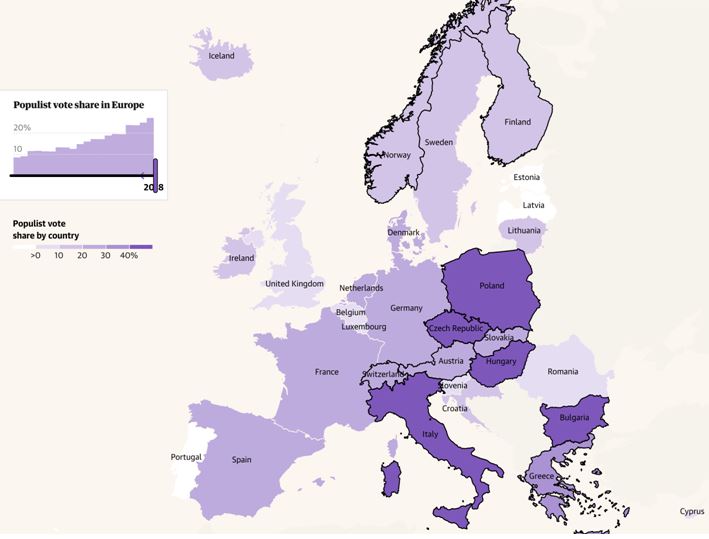The decline of populism in Europe

This phenomenon of the limits being tested and rejected as ineffective is also playing a role in the difficulties encountered by Matteo Salvini and Boris Johnson in Europe, both of whom have to face a “united front” of big parties joining together to block a third big party considered to be endangering the country by its too radical options. We see that the scenario is close to what we have just described concerning Israel. Initially, these populists (Salvini, Johnson…) made it possible for the citizens’ to express their rejection of the type of globalisation that would lead to the dilution of national identities and interests and to a kind of global-economic totalitarianism. And that’s good! But people raised in the Internet age do not want to be trapped behind anachronistic borders either. The pendulum is thus swinging back towards the middle: national interests AND openness to the world being reaffirmed!

Figure – Populist vote in Europe, 2018. Source: Guardian.
The European election saw the start of a similar process, in which moderate forces at the national level apparently worked in an intelligent way to contain the risk of far-right-wing extremists taking control of the European Parliament (EP). This is a scenario we had anticipated: the fact that groups at the national level would disconnect the EU rather than see it put under the control of extremists united at European level.[1] In our opinion, the choice of David Sassoli, an unknown and left-wing man, while the elections reinforced the strong right-wing bias of the EP, is a way to discredit the EP and weaken it by disconnecting it from the citizen vote. And the European Council, the only European political body in the new configuration, is well in the hands of the centrist dynamics led by Macron (FR), Rutte (NL) and Michel (BE) (see our analyses on this subject), since it is the latter who actually took the job.[2] The choice of Von der Leyen, Minister of Defence of Merkel, as head of the European Commission sends two signals: European defence will be an absolute priority for the next mandate and the Commission will be reduced to its administrative function in charge of implementing the Council’s political decisions.
At the heart of this new configuration of a Europe re-established in its nations, is that the unanimity rule is now a thing of the past. It is noted that “no one can move forward if we wait for everyone to agree; instead, it will be enough if no one is resolutely opposed.” It was the second part of this new rule that eliminated Johnson and Salvini, their agendas being too dangerous for others.[3] And it is also the first part of this rule which, on the contrary, allows France to make progress on GAFA taxation, for example, by finally dragging in its wake a whole bunch of countries in Europe and beyond, via the OECD in particular.[4] Or Germany to make Nord Stream II progress despite all the obstacles in the way….[5]
We note again that the country most in conflict with the unanimity rule for decisions was the United Kingdom… at least as long as this served the purpose of weakening the continent while leaving them free rein. Hence, we reiterate how much the British referendum and the prospect of a Brexit have enabled Europe to begin its modernisation process, which it had been dragging its feet over for 30 years…
Register here and read the entire report in the GEAB 137
[1] Read, in particular, the section Member States ready to dismantle the EU in this article in our March 2018 issue: Source: Europe 2018: The EU unplugged, GEAB, 15/03/2018
[2] Source: Deutsche Welle, 03/07/2019
[3] Source: The Independent, 04/09/2019
[4] Source: Les Numériques, 11/02/2019
[5] Source: Bloomberg, 12/09/2019




Comments